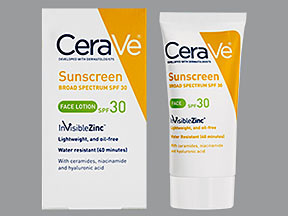SUNSCREENS - TOPICAL
PHONETIC PRONUNCIATION:
GENERIC NAME(S): oxybenzone/padimate O
Uses
USES: Sunscreens are used to protect the skin from the harmful effects of the sun. They help to prevent sunburn and premature aging (e.g., wrinkles, leathery skin). Sunscreens also help to decrease the risk of skin cancer and also of sunburn-like skin reactions (sun sensitivity) caused by some medications (e.g., tetracyclines, sulfa drugs, phenothiazines such as chlorpromazine). The active ingredients in sunscreens work either by absorbing the sun's ultraviolet (UV) radiation, preventing it from reaching the deeper layers of the skin, or by reflecting the radiation. Wearing sunscreen does not mean that you can stay out longer in the sun. Sunscreens cannot protect against all of the sun's radiation. There are various types of sunscreens available in many forms (e.g., cream, lotion, gel, stick, spray, lip balm). See the Notes section for information about selecting a sunscreen.
How to use SUNSCREENS - TOPICAL
HOW TO USE: Sunscreens are for use on the skin only. Follow all directions on the product package. If you are uncertain about any of the information, consult your doctor or pharmacist. Apply sunscreen generously to all exposed skin 30 minutes before sun exposure. As a general guide, use 1 ounce (30 grams) to cover your entire body. Reapply the sunscreen after swimming or sweating or drying off with a towel or if it has rubbed off. If you are outside for long periods, reapply sunscreen every 2 hours. If you are using the lip balm form, apply to the lip area only. The spray form is flammable. If using the spray, avoid smoking when applying this medication and do not use or store it near heat or open flame. When applying sunscreen to the face, be careful to avoid contact with the eyes. If the sunscreen gets in your eyes, rinse thoroughly with water. Use cautiously or avoid use on irritated skin. Do not use sunscreen on infants younger than 6 months unless the doctor directs you to do so. It is best for infants to stay out of the sun and wear protective clothing (e.g., hats, long sleeves/pants) when outdoors. If you develop a serious sunburn, or if you think you may have a serious medical problem, seek immediate medical attention.
Side Effects
Precautions
Interactions
Overdose
Images
Reviews
Faq for SUNSCREENS - TOPICAL
Sunscreens are topical products that are applied to the skin to protect it from the harmful effects of the sun's ultraviolet (UV) rays.
Sunscreen is important because it helps prevent sunburn, reduces the risk of skin cancer and early signs of aging, and protects the skin against damage from UV rays.
Sunscreens work by either absorbing the UV rays or reflecting them away from the skin. They contain various ingredients, such as titanium dioxide or zinc oxide, which act as physical blockers, or organic compounds that absorb the UV radiation.
It is recommended to apply sunscreen at least 15-30 minutes before going outside to allow it to fully absorb into the skin. Reapply every two hours or more frequently if sweating or swimming.
Yes, sunscreen does expire. Look for the expiration date on the packaging or bottle. Expired sunscreen may not provide the desired level of protection.
No sunscreen can block all UV rays, but it can significantly reduce the amount of UV radiation that reaches the skin. Look for broad-spectrum sunscreens that protect against both UVA and UVB rays.
Yes, sunscreen can be used on the face. Look for non-comedogenic sunscreens specifically formulated for the face, which are less likely to clog pores or cause breakouts.
Yes, sunscreen can be used on children, but it is important to choose a sunscreen specifically formulated for children's sensitive skin. Consult with a pediatrician for appropriate sun protection for infants under six months.
Yes, sunscreen can be used on all skin types. There are sunscreens specially formulated for different skin types, such as oily, dry, or sensitive skin.
Disclaimer
IMPORTANT: HOW TO USE THIS INFORMATION: This is a summary and does NOT have all possible information about this product. This information does not assure that this product is safe, effective, or appropriate for you. This information is not individual medical advice and does not substitute for the advice of your health care professional. Always ask your health care professional for complete information about this product and your specific health needs.

No Reviews Yet